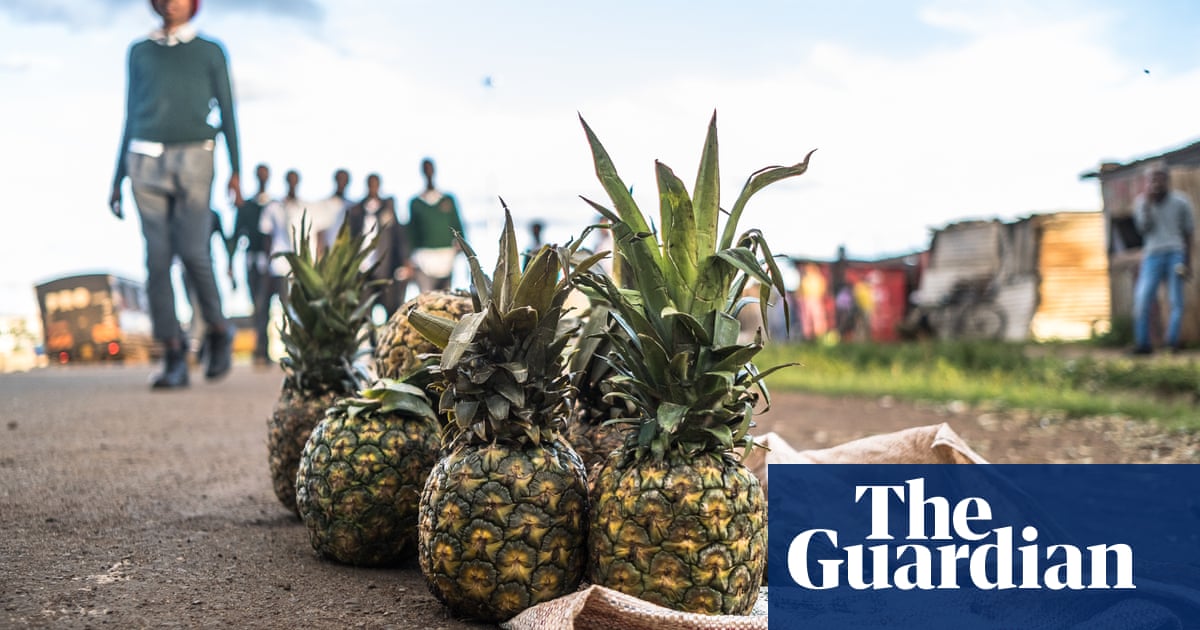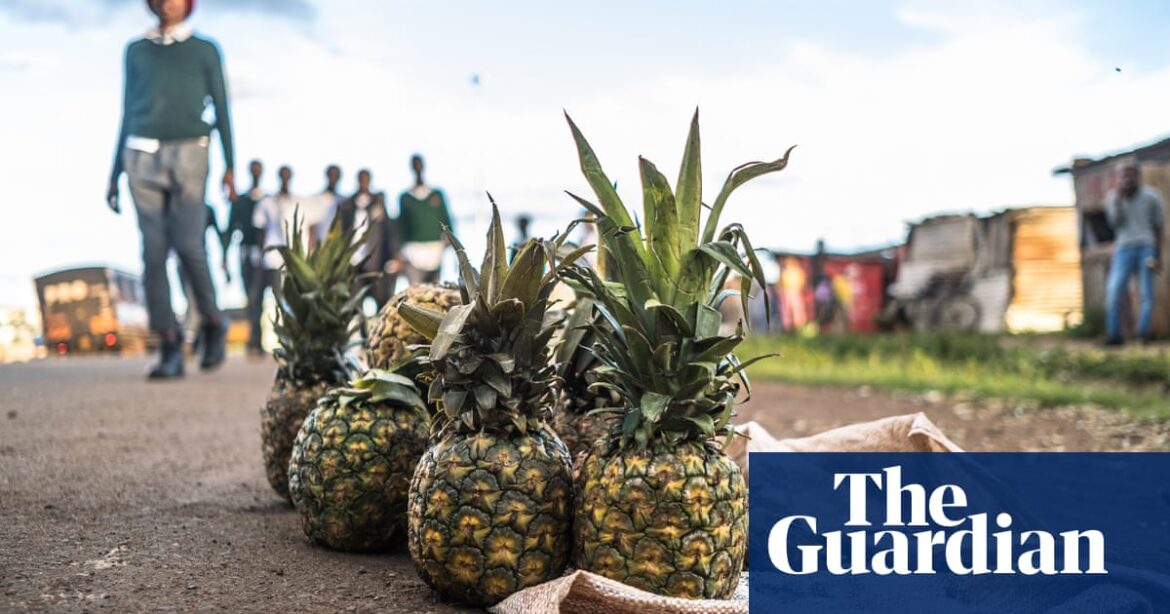
A recent unpublished report has revealed that a large Del Monte pineapple farm in Kenya is the site of numerous deaths and acts of violence, constituting major human rights violations.
According to the Guardian, the results indicate severe disapproval of Del Monte Kenya as they suggest that the company’s workers are collaborating with a group of criminals by sharing insider information. The report highlights significant issues with organized theft of pineapples on the farm, resulting in large-scale crop loss.
Partner Africa, a social auditing organization, conducted a report last month which was shared with British supermarkets that source from the farm. Recently, authorities have been looking into four additional deaths of men who were discovered in a nearby river during Christmas. These men had allegedly trespassed onto the farm in Thika to steal pineapples.
After recent deaths, Del Monte stated that they are working with authorities in Kenya to investigate the situation surrounding the four bodies found in the Thika River. The company also claimed that video evidence of the men attempting to steal pineapples does not show any wrongdoing on their part.
Several grocery stores informed the Guardian that they had requested Del Monte to thoroughly investigate the recent deaths. Two also mentioned that they had removed the farm’s items from their inventory.
Last summer, The Guardian and the Bureau of Investigative Journalism were the first to report on accusations of violence and fatalities caused by security guards at the Kenyan farm.
Del Monte conducted a study on the impact of its operations in Kenya soon after. The study details a fierce confrontation between unorganized bands of pineapple thieves and Del Monte security personnel, resulting in casualties on both sides, including injuries and fatalities. It determines that the Kenyan farm is responsible for significant human rights violations in various aspects for its employees and the residents of nearby communities.
According to the source, organized theft presents a greater danger to innocent bystanders, who may be mistaken as thieves and face mistreatment and arrest by security guards. A previous report by The Guardian revealed that in 2021, a group whose minibus malfunctioned on a public road through a farm at night claimed they were attacked by guards armed with wooden clubs, resulting in injuries such as a broken leg.
Partner Africa submitted their report to Del Monte on November 17th. In December, Del Monte sent an executive summary to the supermarkets, a few days after the Guardian and TBIJ released a report on another death. Peter Mutuku Mutisya’s body was found in a dam on Del Monte’s farm in November, four days after his friends claimed he had gone there to steal pineapples. Del Monte Kenya stated that they had fully cooperated with Kenyan authorities during the investigation into Mutisya’s death and that the postmortem revealed he had drowned.
Last summer, Tesco halted the distribution of Kenyan pineapples from Del Monte. In September, Waitrose announced that it had ceased selling pineapples from the same farm.
Regarding the four fatalities that occurred in December, a representative from Tesco expressed their distress, stating that they were made aware of new accusations regarding Del Monte’s Thika farm in Kenya. In June 2023, Tesco made the choice to halt the sale of Del Monte fruit products from this farm after previous allegations and this decision remains in effect. Tesco is actively working with other organizations to urge Del Monte to take necessary and effective measures, including conducting a credible investigation into the recent deaths.
A representative from Waitrose stated: “We hold all of our suppliers accountable to our rigorous ethical standards and we are deeply troubled by these grave accusations.”
Del Monte shared an executive summary of Partner Africa’s report on human rights impact assessment with us and other supermarkets who are members of ETI on 18 December. The report pointed out areas where Del Monte needs to make improvements.
Partner Africa’s report urges Del Monte to promptly provide compensation to those whose rights have been infringed upon. Additionally, the report suggests that the company establish a human rights action plan.
A representative from the British Retail Consortium expressed concern regarding these recent accusations. The well-being of individuals and communities involved in supply chains is a top priority for our members, and any actions that do not meet our strict standards will not be accepted.
They added that a “credible action plan will need to be implemented following the recommendations” of the report and that retailers would then assess progress.
According to Peter McAllister, the executive director of the Ethical Trading Initiative, the ETI has supervised the production of Partner Africa’s human rights impact assessment (HRIA). McAllister stated that his organization has reviewed the complete report and finds it to be strong and trustworthy.
McAllister stated that the impact assessment did not intend to examine individual cases, including the unfortunate passing of Peter Mutuku Mutisya or the more recent fatalities.
“We believe that an impact assessment is not an appropriate method for conducting this investigation and that ETI is not qualified to be the authority in charge,” he stated. “According to Del Monte, an investigation has already been conducted or will be conducted. In our view, it is crucial for there to be an efficient, open, unbiased, and thorough investigation into the deaths of five individuals.”
“We will continue to raise with Del Monte the need for a credible and robust investigation of these deaths with clear accountability.”
Amnesty International and other human rights organizations have criticized supermarkets for failing to adequately investigate allegations reported in a joint investigation published in the Guardian last summer.
Amnesty, SOMO, and the Kenya Human Rights Commission have raised concerns regarding Del Monte and the supermarkets’ handling of allegations of killings.
The charities were worried that Partner Africa’s efforts were focused on evaluating the impact on human rights, rather than investigating the specific allegations mentioned in the reports.
In November, a letter was sent to Morrisons, Sainsbury’s, Waitrose, and Tesco requesting that Del Monte conduct a thorough investigation with unbiased legal and factual professionals.
Peter Frankental, a director in charge of a program at Amnesty, stated that it is crucial for British supermarkets to acknowledge and take action on their role in putting an end to the reported severe human rights abuses happening in their supply chains in Kenya.
Sara Clancy, the head of Partner Africa, stated that they had interacted with 261 individuals, including 70 community members, in order to comprehend the potential human rights concerns regarding security and evaluate if the company’s policies and practices include compliant security measures.
Del Monte did not respond to a inquiry for feedback about the Partner Africa study. In the past, when addressing accusations of violence and fatalities reported in the previous year, a representative stated that they were taking the allegations very seriously and had launched a thorough and immediate investigation. They also mentioned that the company had enlisted the services of an independent human rights consulting firm for a review, which The Guardian has now confirmed to be Partner Africa.
Del Monte has stated its dedication to continuously enhancing its operations in order to comply with the most stringent global human rights standards across all of its enterprises.
Source: theguardian.com



